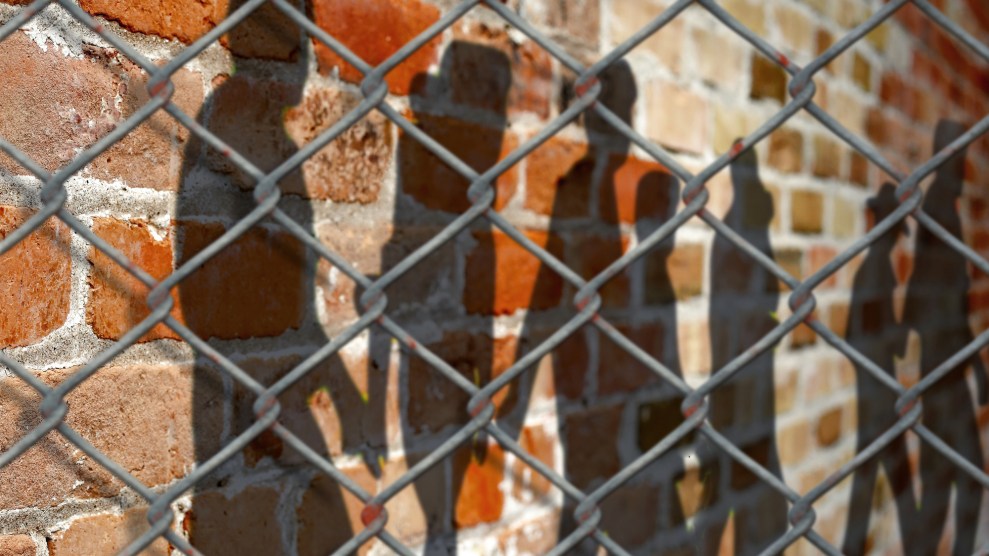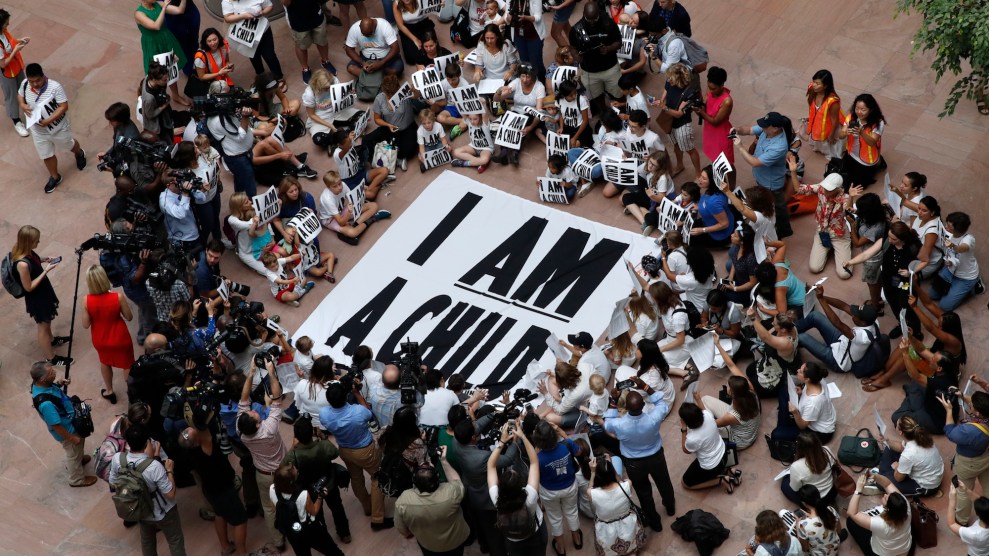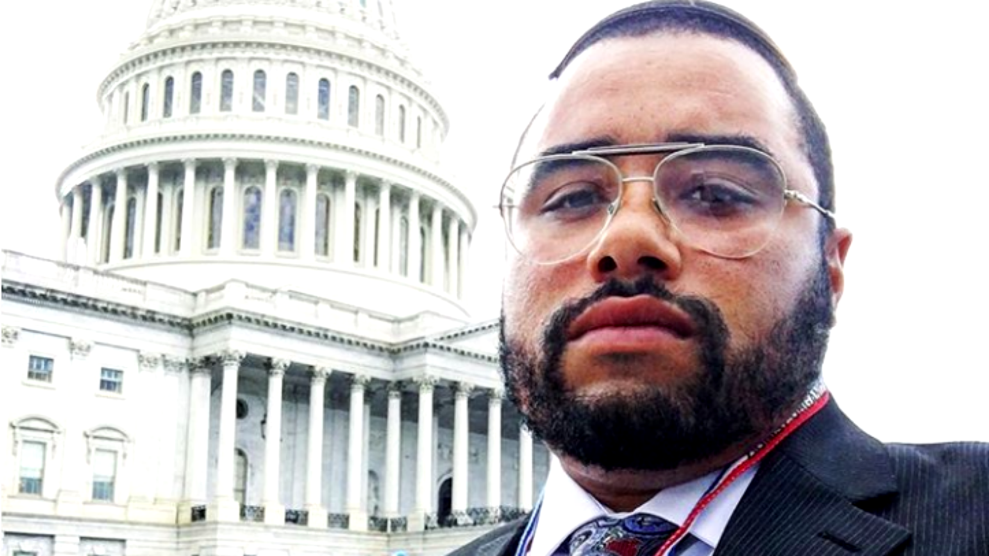
Getty Images
This story was originally published by ProPublica. It includes graphic details of alleged sexual violence against minors.
Leer en español aquí.
A youth care worker for Southwest Key has been charged with 11 sex offenses after authorities accused him of molesting at least eight unaccompanied immigrant boys over nearly a year at one of the company’s shelters in Mesa, Arizona, federal court records show.
The allegations against Levian D. Pacheco, who is HIV-positive, include that he performed oral sex on two of the teenagers and tried to force one of them to penetrate him anally. The other six teens—all between 15 and 17—said Pacheco had groped them through their clothing. All of the incidents are alleged to have taken place between August 2016 and July 2017, according to a court filing last week that laid out the government’s case.
The case, initially investigated by local police, is now proceeding through US District Court in Phoenix. Pacheco had worked at Southwest Key’s Casa Kokopelli shelter, one of eight the company runs in Arizona, since May 2016.
Casa Kokopelli was cited by the Arizona Department of Health Services in 2017 for failing to complete background checks, including fingerprinting, to ensure that employees hadn’t previously committed sex offenses and other crimes, records show. Pacheco worked for nearly four months without a complete background check, according to documents and an agency official. Those records did not show any previous arrests or convictions for sex offenses, they said.
Pacheco, 25, was indicted in August 2017 after an investigation by local law enforcement and the US Department of Health and Human Services inspector general’s office. The current charges include eight counts of abusive sexual contact with a ward and three counts of sexual acts with a ward. Pacheco, who is in US Marshals’ custody, could not be reached for comment, but he denied the charges in court documents. His federal public defender, Benjamin Good, said, “We are looking forward to defending Mr. Pacheco in court.”
Trump administration officials have repeatedly asserted that the shelters are safe, even fun, places for kids. But there has been increasingly intense scrutiny of the federally funded, privately run shelters after the administration separated some 3,000 children from their parents at the border and sent them to shelters and foster homes across the country. Last week, ProPublica reported that police nationwide have responded to hundreds of calls reporting possible sex crimes at shelters that serve immigrant children. One of those calls resulted in the conviction of a Tucson shelter worker for molestation.
Now further documents have emerged describing alleged incidents in Arizona involving Southwest Key, the largest operator of immigrant youth shelters nationwide.
ProPublica only discovered Pacheco’s case while trying to find additional information about a vague reference to a molestation case in Arizona inspection records. Federal officials had known about the case when answering questions from ProPublica last week and when describing the conditions of the shelters before Congress, but did not mention it.
In addition to Pacheco, two other cases involving abuse at other Southwest Key shelters have recently surfaced.
On Tuesday, an employee at a Southwest Key facility in Phoenix, Fernando Magaz Negrete, was arrested on allegations that he sexually abused a 14-year-old girl by kissing her and rubbing her breast and crotch, according to Phoenix news outlets. And The Nation reported Friday that a 6-year-old girl who had been separated from her mother was allegedly fondled by a boy at another Southwest Key facility in Glendale, Arizona in June.
At other Southwest Key facilities, police reports and call logs from the last five years detail inappropriate relationships with staff, dozens of runaways, sexual contact among kids at the shelters and other allegations of molestation by employees. In one case, ProPublica found, a 46-year-old youth care worker in Tucson was convicted of groping a 15-year-old boy who had just arrived in the United States five days earlier.
In an email, HHS spokesman Kenneth Wolfe said the agency has issued a stop placement order and removed all unaccompanied minors from the Casa Kokopelli shelter. He declined to say when the stop placement order was issued.
“These are vulnerable children in difficult circumstances, and the Office of Refugee Resettlement at HHS’ Administration for Children and Families treats our responsibility for each child with the utmost care,” he said. “Any allegation of abuse or neglect is taken seriously.”
In response to questions from ProPublica, Jeff Eller, a spokesman for Southwest Key, wrote in an email that he was unable to comment on specific cases. When asked how Pacheco’s alleged actions could have escaped detection for 11 months, Eller didn’t answer the question, but said: “Any employee accused of abuse is immediately suspended and law enforcement called. This is what we did in this case.” Eller said the allegations were also reported to the federal Office of Refugee Resettlement, which oversees the shelter system, and the appropriate state agency.
In response to a question about how the company could assure the public that children are safe in its facilities, Eller wrote: “We find the premise of your question dishonorable.”
“We report these cases to law enforcement and state agencies when they happen,” he said. “We educate every child in our care upon arrival to the facility of their right to be free from abuse or neglect in this program and this country. This message is repeated to the children throughout the duration of their stay at our shelters.”
In the past five years, the Texas-based nonprofit has received more than $1.3 billion in federal funds for the shelters and other services—including more than $500 million so far this year.
This week, following numerous reports of problems at the federally funded facilities, Sen. Charles Grassley (R-Iowa) and Sen. Dianne Feinstein (D-Calif.) requested that the inspector general for the US Health and Human Services department investigate the allegations of sexual and physical abuse at the shelters.
“These allegations demonstrate a long-term pattern of abuse warranting a thorough investigation into the claims, including the process and procedure by which any guards or contracted staff are hired, trained, and vetted,” the senators wrote in a letter to the inspector general.
HHS said Thursday that shelter operators reported 264 allegations of sexual abuse to the FBI last year. While those can include anything from “touching of the buttocks” to sexual assault, the agency said, 53 allegations involved an adult. The agency did not say how many of those allegations were founded or how many constituted more serious assaults.
Federal court records show that officials at the Southwest Key shelter in Mesa were unaware that Pacheco was abusing boys for months—and that it wasn’t until one of the boys spoke up last summer that the extent of the abuse allegations against Pacheco was uncovered.
Shelter officials first learned that Pacheco may have abused a boy at the facility when a teen identified in court records as “John Doe 1” told a teacher that a staff member had entered his room in the early morning hours of July 24, 2017 and touched his body, including his penis, over his clothing. The teen then told his roommate about the incident and that boy, known as “John Doe 2,” said the same staffer had fondled him in a similar way.
The second teen initially denied the incident when he was approached by staff members. Several hours later he told staffers that Pacheco had come into his room early one morning, tickled him and touched his “private parts.”
Pacheco was then removed from the facility and local law enforcement launched an investigation, records show.
The next day, July 25, a third teen told a shelter counselor that he had heard about Pacheco’s dismissal for inappropriately touching other boys. The teen told the counselor that Pacheco had also fondled him and that he was aware of three other boys Pacheco had molested. That child would later tell a “forensic interviewer” that Pacheco had groped him twice.
Local law enforcement and shelter staff tracked down those three teens and two others, who all said that Pacheco had molested them.
The fourth teen in the court records reported that Pacheco had touched him over his pajama pants sometime in June or July of 2017.
A fifth boy, who had been moved from Casa Kokopelli to another facility in Arizona, said he was brushing his teeth, and when he opened the bathroom door, Pacheco was standing there holding toilet paper. The boy said Pacheco then touched his penis over his clothing, the records show.
A sixth teen reported that Pacheco opened the shower door while he was bathing and stared at him but did not touch him. The boy later told social workers that on another occasion, he was changing his clothes after a soccer game when Pacheco walked into his room and said “My love, I have arrived,” according to court records. Pacheco proceeded to grab the boy’s penis, the teen said. Pacheco then laughed and told the child he “had it big,” the records show.
The seventh teen, “John Doe 7,” is the same victim whose allegations were briefly referenced in ProPublica‘s story last week. The boy had been at the Mesa facility and was transferred to Tucson, where he revealed the molestation allegations to officials. The teen said he had been recovering from surgery in early June of 2017 and was groggy from pain medication when he awoke to find Pacheco in this room. Pacheco told the boy that he had a “big one.” The teen said he could tell that Pacheco had “ejaculated on himself,” according to court records.
On another occasion, the teen told officials, he was playing video games when Pacheco entered the room and told the boy to take out his penis. The boy refused and Pacheco grabbed the teen’s penis through his pants, according to court records. During a third incident, the teen said Pacheco pushed him down on a bed, pulled down his pants and underwear and began to shake his penis. The boy said he attempted to push Pacheco away, but was unable to because of his injury and surgery. Pacheco put the boy’s penis in his mouth, the court records state.
The eighth boy alleged that Pacheco came into his room and woke him by making noise with the blinds. Pacheco then told the boy he was going to “suck his,” according to court records. The boy said Pacheco took down his pants and put his mouth on the teen’s penis three times. The boy describes a separate incident in which Pacheco entered his room around midnight, took off his own pants and underwear and told the boy he wanted the teen to put his penis in Pacheco’s “butt,” records state.
Pacheco then attempted to force the boy’s penis into his anus, but the boy pushed him away and threatened to report him, according to the records.
Pacheco disclosed he was HIV positive when he was arrested, according to court records. Officials with the Southwest Center for HIV/AIDS educated the teenage boys about HIV and how it is transmitted and a “couple” of the eight children sought testing, records state. It’s unclear what the results were.
Five of the eight teenagers that Pacheco is accused of molesting either denied or didn’t disclose the allegation when first approached by interviewers and staff members.
Nayeli Chavez-Dueñas, a clinical psychologist who helped develop shelter guidelines on behalf of the National Latina/o Psychological Association, said she wasn’t surprised that alleged abuse went on for so long “because a lot of the children are terrified.” Many of the children have experienced sexual and physical violence, she said, and in the shelters, they face a lot of uncertainty.
“So when you have adults that are taking care of these children that are so vulnerable,” Chavez-Dueñas said, “they know that the children are going to be so afraid for their safety that they are not likely to report.”
Pacheco’s trial is scheduled to begin on August 28.












